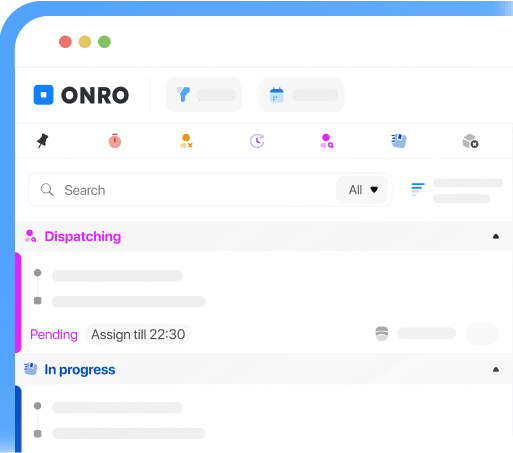Knowing the best fleet management practices is fundamental for courier companies. Fleet management is a service area that ensures that all motor vehicles in the vehicle fleet of the courier companies comply with legal processes, that vehicles benefit completely from service, insurance, and warranty services, and ensures that the fleet is used and managed at the lowest cost and with the highest efficiency.
Try Onro for Free
Get your free access to the Onro All-in-one Last Mile Delivery Software.
What Does Fleet Management Do, and What Are Its Responsibilities?
According to the Sptel article, all needs of fleet management can be met by the department in this field within the courier company, or external resources created for management can be used. Fleet management is not an area used only for delivery vehicles. Fleet management covers three main components. These are; supplier relations, driver support services, and integration with in-company departments. Integration with the in-company department is the involvement of all units within the company in the planning, budgeting, and operational management processes of the courier company. All of these issues we mentioned can be given as answers to the question of what fleet management does. The duties and responsibilities of fleet management can be listed as follows:
- To check the invoices received regarding the fleet and to ensure the classification of the documents.
- To ensure that agreements are made with vehicle maintenance services and that their operations are carried out.
- To fulfill the legal obligations required for the vehicles to enter traffic.
- To manage the technical inspections of vehicles and the coordination of their maintenance.
- Identifying disputes between parties and developing suggestions for their resolution
- Implement policy changes and ensure execution by adjusting transportation planning.
- Ensuring coordination by negotiating with suppliers
Best Practices for Fleet Management in Courier Companies
1. Organize the operation routine for your courier company
The fleet management manager must be organized and know how to manage his or her time and that of his team well. Efficient management in a courier company is preceded by proper time management, with priorities correctly listed and tasks performed without delays or extensions.
The first thing that should be done for the proper management of transportation and logistics is the proper planning and scheduling of drivers and motor couriers. The goods delivery program should be arranged in such a way that the drivers can carry out the work in a short period of time and within the specified time frame.
Supply chain operators and transportation department managers must be able to create a comprehensive workflow to ensure good team performance. The goal of transportation planning is to achieve maximum results and profit in the shortest possible time.
Although great planning should ideally lead to great results, a good manager must be able to prepare for the unexpected. Such as vehicle shortages, shipping delays, or shipping damages.
If all the tasks of managing the transportation fleet are performed manually, and by manpower, it will be difficult for the manager to identify the problems, monitor the progress and take corrective actions. Therefore, it is very fundamental to adopt a centralized system that integrates all processes.
This work is easily done with the help of the GPS tracker system. GPS trackers improve the transportation process by checking the best and shortest routes as well as low traffic routes. Trackers also allow fleet managers to monitor driver performance, making it easier to better plan future routes.
2. Use the GPS tracker for courier management
There is no better way to simplify your transportation management than to automate it. An automated shipping management solution using a courier tracking system simplifies the process of shipping goods. Using tracking apps, fleet managers can find out which vehicle is operating, where it is and what route it took.
A high-quality GPS tracker like Onro in addition to facilitating transportation tracking, also provides logistics managers with other facilities, including:
- Record travel routes
- Planning for future delivery trips
- Determining the location of the car and tracking the drivers
- Track the status of the shipment based on the delivery schedule
- Providing complete analytical data
3. Perform people-focused management in a courier company
An expert manager knows the skills and ways of working of each member of his or her courier team, knowing how to extract the full potential of his or her group. He or she seeks to find ways to motivate them so that productivity is not affected and the planned objectives are achieved.
4. Train and qualify your courier team
Having your delivery fleet team well prepared and motivated to perform their tasks is of utmost importance, and to do so, it is fundamental to be attentive to their preparation as a whole.
Offering and knowing how to evaluate the effectiveness of driver training is an excellent way to keep them updated and motivate your team to achieve the established goals. In addition to motivation, training contributes to a better relationship between the courier company and the employee.
5. Know your market
In their daily work, fleet management professionals make many fundamental decisions regarding the entire logistics process, and to make them correctly, they need to have in-depth knowledge of the market, its seasonality, and the segment in which they operate. Benchmarking is a relevant method at this point, as it systematically seeks out more awesome processes, ideas, and procedures that always lead to better performance.
6. Know how to communicate
Communication gaps should always be avoided, as they lead to misinterpretations and, consequently, to problems in the course of operations. It is fundamental for the fleet manager to be clear in his or her determinations, ensuring greater agility and precision in their development, thus avoiding any type of rework. By investing in delivery notifications, the manager manages to establish more relevant conversations, also demonstrating the appreciation of his or her employees and customers.
7. Has emotional resilience
With the great responsibilities he or she has in his/her hands, the fleet manager in a courier company must be sensitive to deal with any conflicts that may arise, knowing how to overcome all adversities calmly and without taking hasty actions. He or she must also have the ability to handle pressure and demands, while maintaining the same level of production and analysis.
8. Understand finances
To make better decisions, managers of courier companies need to understand and analyze everything related to their fleet costs. There are software programs that collect data on their drivers’ driving, showing what the biggest expenses are, making it easier to identify where they can work to make their operations less expensive. This fact helps in the construction of plans with more accurate cost forecasts and a greater possibility of satisfactory profitability.
9. Understand the difference between investment and expenditure
When managing a fleet for a courier company, it is fundamental for the manager to understand which aspects generate costs and losses, and which require investment to increase productivity. Fleet renewal, for example, can be seen as an unnecessary expense. However, new vehicles can significantly reduce maintenance costs. Thus, a phenomenal manager must act in a practical and technical manner, and evaluate actions based on the long-term results and savings they can generate for the operation.
10. Think strategically
In addition to the ability to constantly update themselves on trends in their area and in the courier market, a fleet manager must have the ability to apply their knowledge to the reality of the operation, whether during strategic planning or during emergency situations. A competent fleet manager is able to make quick and assertive decisions to preserve the integrity of the operation.
11. Master the information
Innovative fleet management technologies play an important role in this area, as it collects the largest possible amount of data on the fleet with reports available at all times, facilitating the verification of results and, consequently, decision making is faster and safer.
12. Standardize processes
The activities derived from fleet management must be carried out in the best possible way and in an integrated manner. To do this, it is in the manager’s interest to create and manage a standardization of courier operations, so that all activities related to the fleet must be developed in accordance with the established standard. In this case, a document such as the fleet policy can make a big difference towards more efficient management in courier companies.
Onro’s Fleet Management Software for Courier Companies
Having full control over the delivery and courier’s travel journey is fundamental to the success of a courier company. Therefore, it is fundamental to have software to perform the main functions when it comes to courier monitoring.
1. Real-time monitoring
The stunning benefit of having fleet management system in your courier company, is certainly the possibility of monitoring courier vehicles in real time, 24 hours a day.
This way, it is possible to fully guarantee safety during travel, without affecting the quality of the service provided. Among the advantages of management, we can also optimize the routes, since they are the most important things in increasing the efficiency. This way, your courier company can act in prevention, bringing cost saving to your business.
2. Customer and employer databases
Another use of Onro’s fleet management system in courier companies is to create databases of customers and employers. By storing these databases, you can archive information and access them in crucial situations. This information is used to analyze, predict, and process data and gives managers a better view of the current situation, background, and future of the courier company’s fleet.
3. Shifting and assigning tasks
Determining the duties of personnel, defining the mission, scheduling, and all the timings related to actions and performing tasks can be planned and implemented in Onro’s fleet management software. For example, with the help of Onro, you can specify the duties of each driver, at what time he or she is required to start and end the trip, and which drivers should be ready at any hour of the day or night.
4. Route calculation
The tenth benefit is route calculation, because in addition to all the care taken with the safety of the route, cargo, vehicles, and drivers, it is also essential for an astonishing experience to have a fast service carried out via the best roads.
With route optimization, it is possible to study which routes are the fastest or cheapest, without neglecting the concern for the quality of the routes, acting to prevent excessive expenses and improve vehicle maintenance management.
Try Onro for Free
Get your free access to the Onro All-in-one Last Mile Delivery Software.

What Industries Can Use Fleet Management Software?
1. Distribution companies
Broadcasting and distribution companies that operate in the field of providing transportation services for goods and products to other companies, factories, and productions, usually have a large number of cars, and collecting, analyzing and managing information related to each car has its own problems.
But with the launch of Onro’s fleet management system, the managers of these companies can have detailed, instant and categorized information along with detailed analysis, without any trouble. With Onro, all stages of receiving, delivery, and movement of each vehicle are determined.
2. Online shops
Another business that needs fleet management systems are online stores that use different types of vehicles to transport and move products. Of course, Onro software is used for an online store that has not outsourced the transportation of products and has a private fleet.
3. Restaurants and catering
Food industries, restaurants and caterers usually try to improve their businesses by creating a subcategory that includes several vehicles. But in order to reduce their costs, they must use management software. Onro software allows restaurants to monitor the performance and behavior of their couriers and minimize the delivery time of their customers’ orders.
4. Hospitals and medical centers
Industries that deal with people’s lives and health should have more careful monitoring of their personnel and hardware equipment. A major part of the activity of hospitals and medical centers is related to the transportation of medicine, the transfer of patients, and the provision of on-site medical services, and the role of vehicles is clearly evident in these processes.
In this situation, managers should definitely think about Onro’s fleet management software to manage the time of movement and transfers and provide medical services in the best conditions and time.
Conclusion
So, knowing the best fleet management practices is crucial for courier companies. Fleet management is a process that enables the management of all fleet information and assets, which reduces costs, increases efficiency and profitability of the fleet.
Fleet management in courier companies can optimize various areas such as supply chain, repairs and maintenance, fuel consumption, customer relations, employee monitoring, driver and vehicle safety. It also enables courier companies related to delivery fleets to minimize courier business risks to be more productive, which shows the high importance of this process.


